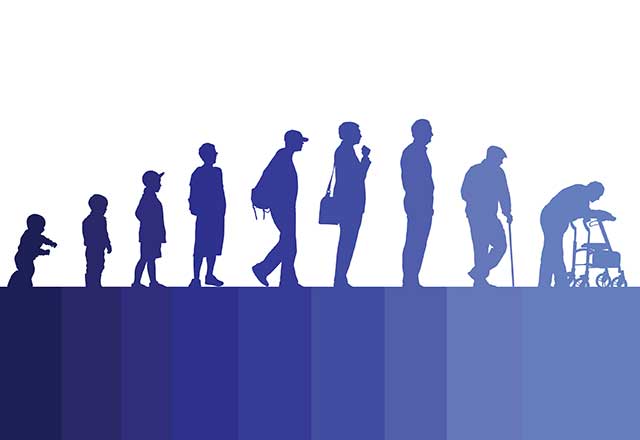The search for longevity is a tale as old as time. The ancient Mesopotamian poem, The Epic of Gilgamesh, describes the journey of the eponymous hero Gilgamesh to find the secret to eternal life, which ends in failure. In classical China, the first emperor, Qin Shi Huang, tasked alchemists to find the elixir of life, allegedly even consuming mercury in hopes of extending his years. A modern parallel to the search for such an elixir is embodied in Calico Labs, a Silicon Valley biotechnology company funded by Google to research the genetics and cell biology of aging and aging-related diseases and develop treatments to extend healthy life. The desire for longevity, perhaps even immortality, seems to be a constant in human history.
Healthy Aging
Even in my own family, I see glimpses of this desire. As my parents, aunts, uncles and other senior members of the extended family reach ages past 50, the quest for healthy aging begins. In some, this takes the form of starting a new athletic hobby, such as tennis (my dad) or running marathons (my mom). In others, this takes the form of religiously watching YouTube videos on health supplements and swearing by pill XYZ to prevent neurodegeneration (my aunt). Some fixate on controlling diets, whether eating all organic, starting a keto diet or “eating enough potassium” (my uncle). At family reunions, the conversation on what is a healthy lifestyle predominates. Beneath the buzz of conversation, the question of how many decades remain and what those decades will look like is always lurking in the background.
In the primary clinic where I worked as a second-year med student, the typical patient was a 65-year-old coming in for a regular checkup or an annual physical exam. As I reviewed patient charts, what surprised me was the large variance in health and medical history in aging. I saw 80-year-olds with no medical problems whatsoever and enjoying a highly active life. I saw 55-year-olds with a past medical history a mile long and numerous age-related problems, ranging from cataracts to vertebral fractures to atherosclerotic plaques in blood vessels, which had to be managed and monitored closely. There was no “typical” elderly patient, and the aging process seemed to be wildly different in each individual. What I observed was paradoxical — everyone experiences aging, but the rate of aging diverges greatly person to person.
A "Cure" for Aging
In medical school, I learned about numerous diagnoses of different organ systems, but there was no single diagnosis of “old age.” Age is a strong risk factor for many diseases, from osteoporosis to cancer to stroke, but it is not defined as a “disease.” There is no diagnostic label for old age, and there is no medication specifically for aging. Aging is a process we do not understand very well. The truth is that medicine does not have the answers in aging, despite how many people seek the secret to longevity. Medicine is built around specific, well-defined problems like appendicitis, for which we have diagnostic criteria and effective treatments. It does poorly against the amorphous, undefined problems of aging. There are measures, such as healthy diet, quitting smoking and regular exercise to mitigate risk of individual age-related diseases, more prominently heart attacks and strokes, but they do not touch on the greatest risk factor of all: age itself. When faced with the inexorable march of time on the human body, medicine has yet to hold the answers. The best we can do is manage and fix wear-and-tear, from cataracts to osteoarthritis, as they creep up in our patients.
As the U.S. population ages and life expectancy increases, the question of healthy aging will become more and more salient. More people will embark on the same quest as Gilgamesh, looking for longevity. Aging is still uncharted territory in medical research, and it is unclear what answers will be revealed, if any at all. The best I can hope for my family, my patients and myself is that we will, if only by blind chance, enjoy a long and healthy life.
[themify_hr]
Related Content
- Out with the Old, in with Repaired Joints
- Genetic Double-Agents Are Making You Old
- Reading and Writing the Immune System
Want to read more from the Johns Hopkins School of Medicine? Subscribe to the Biomedical Odyssey blog and receive new posts directly in your inbox.

This is a good time to research this, as aging truly is unchartered territory. The population is certainly aging.
I'm going to my dissertation (hopefully), on the impact of crime on elder victims and witnesses . Many people aren't aware the toll that is taken on older people who traverse the Criminal Justice System, as either victims, or witnesses of crime. I started looking into this, several years ago, after one of my daughters was murdered, and I indeed took the witness stand. By the time I took the stand as a witness, in 2011, I was 53 years old. I was articulate, still conducting background investigations for the federal government, but on the stand, I tripped over words, forgot significant facts that I knew, and my my mind went blank. I felt much older than 53, that day. And yes, I had been prepped.
The defense attorneys expected this tohappen, and capitalized on it. I forgot many simple details, I felt much older than I was, at that time - and I still do. A prosecuting attorney advised me that this issue was their biggest issue, in getting convictions, with elder victims and witnesses.
I'm going to my dissertation (hopefully), on the impact of crime on elder victims and witnesses
Comments are closed.